Complimentary worldwide shipping on orders over $400 · No import tariffs for most countries
Complimentary worldwide shipping on orders over $400 · No import tariffs for most countries
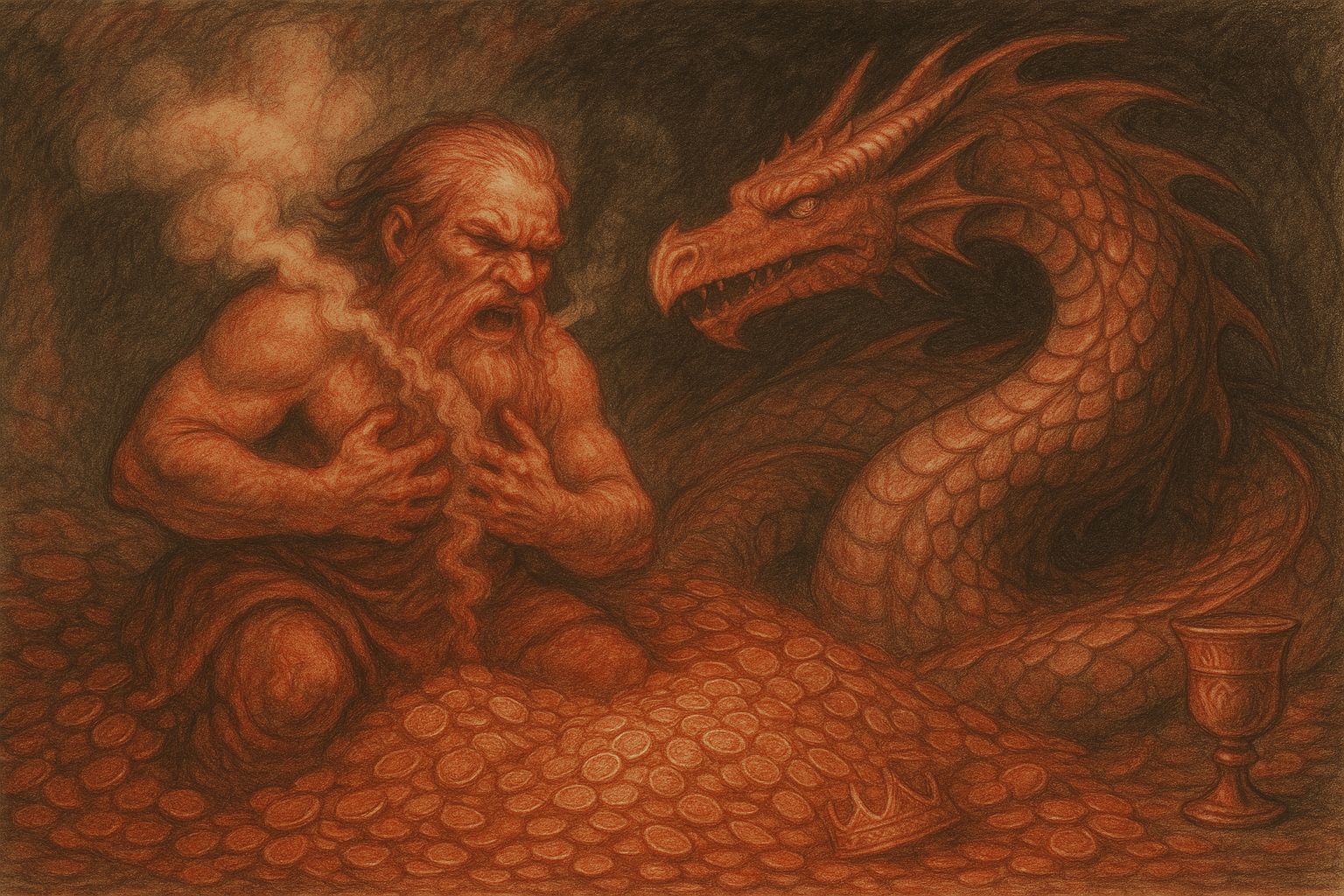
The Wound That Guards Itself
Smoke thickened as the dwarf’s breath learned the weight of gold.
His chest rose against itself, ribs grinding as veins caught flame.
The hoard glowed with a light that burned without fire, coins whispering like teeth.
Every inhalation dragged hunger deeper; every exhalation veiled the cavern in scaled smoke.
The treasure was only the wound that guarded itself.
He said no prayer that did not glitter. He drank nothing that had not touched ore.
He slept with his head on a heap of small crowns as if listening for a king’s dream.
Gold crept into the sweat of his palms until touch itself seemed plated.
He had learned to measure night by shimmer rather than stars, silence by how much it weighed.
Hunger moved under his skin like a river under ice, not flowing, only pressing, only waiting.
He counted by coin and breath: a hundred breaths to a single handful, a thousand to a chalice lifted then set aside, unsipped.
He did not notice when smoke began to curl from his ribs, a pale incense without heat.
He did not notice when the echo in the chamber lost its edges and came back round, round, like a ring.
He did not notice when the hoard arranged itself into a shape that was not merely heap, not merely hill, but throne and cage together—gleam teaching geometry to want.
—
Flesh hardened into scale; desire calcified into armour.
His ribs smoked like incense, yet the prayer was hunger.
The hoard glimmered like prison bars, each coin a lock that bit inward.
Gold poured into sinew until no bone remembered itself.
The wound became the guardian; the treasure bled silence.
He felt the first plate rise beneath the skin, not as pain but as arrival: a coolness, a thin bright edge learning how to lie flat.
The second plate came hotter, a kiss that burned a promise into the flesh it replaced.
By the third, breath made a new music, the clatter of rings within rings; by the tenth, nothing moved that was not gilded with purpose.
He reached for a cup; claws touched it first. He reached for his own throat; armour turned the gesture into a blessing for the prison he wore.
He tried a word for mercy and produced only smoke. He tried a word for enough and produced only more.
Hunger, being older than language, took the tongue and taught it to obey.
The cavern learnt to hold him—ceiling lowering by the weight of his breath, walls bending closer, floor softening where molten dust settled into shallow beds.
He understood at last that the hoard’s light had been seeing him all along, had been learning his shape, had been pouring itself into that given mould.
He lay then, not from fatigue but from accumulation, a hill of armour ringed by smaller hills, a storm that remembered how to wait.
His eyes, when they opened, were wells with coins at the bottom; his pupils were the holes drilled through those coins for stringing.
He saw everything by jewel-light, which is to say he saw value first, edges second, and faces not at all.
Smoke travelled the lanes between plates like thought, like doubt, like a memory that refuses both origin and end.
—
He learned to coil for warmth, and in coiling he measured his own circumference against the chamber, and the measure pleased him.
Armour sang when he breathed, a bellows-hum that turned silence into something like worship.
He tired of worshippers imagined or real; he tired of the sky he no longer saw; he did not tire of counting.
He matched breaths to coins, claws to chalices, eyelids to shields; he discovered that the heart, if properly weighed, could be a scale.
Days did not pass; light merely shifted within metal.
Seasons did not pass; temperature lived where he breathed it.
He tasted riverbed silt on the trinkets ferried here by men who love maps more than mothers.
He tasted battle-sweat on blades that had already killed once and wanted to be forgiven.
He tasted the brief shock of a child’s toy—the one gold bead once tied into hair—now cold among crowns, now colder inside him.
Storms could not enter the cavern, yet his silence thundered.
When the mountain shook, it shook to his rhythm.
When the bats swerved, they swerved around the pressure of a thought too heavy to lift.
He knew then that the wound was wide awake. He knew then that it kept its own watch.
He knew then that there is a kind of sleep that armours the dreamer against waking.
Men came. They brought the sounds of weather with them, rain stitched into cloaks, wind trapped in beards, small fears sewn along their hems.
They came for stories, and then for coin, and then for crowns, and then for a single coin again because hunger redefines arithmetic.
They left bones, which learned the alphabet of gold before they learned dust.
They left scratches on plates that looked like writing and were not; they left the memory of laughter, which tarnished slow.
—
A sword came, borne not by hero but by hunger answering hunger.
The blade found seam where scale gaped like split coin.
Metal pierced molten vein, and what spilled was not blood but treasure:
rivers of gold, flames flickering like tongues across the floor, armour softening to ash.
The cavern screamed without sound, as though silence itself were molten.
He had smelled that hunger from far away, a lean steadiness that neither boasted nor shook.
This one did not talk to himself while he walked. This one counted steps as if each were a coin needing audit.
He did not carry a banner or a story that had already learned the shape of victory.
He carried a blade that had been part of a plough, and before that part of a gate, and before that part of a chain.
He carried a look in his eye that understood locks.
He did not cry names of gods or kings. He studied seams.
He waited when the dragon breathed out, where smoke weakened the joint between two bright plates.
He held his own breath as if it were a coin he refused to spend.
When he moved, it was not fast but correct—the way keys move when they do not doubt their doors.
The blade entered with the quiet of bookkeeping and the certainty of theft.
Then flood. Then heat with memory. Then coin without count.
Gold remembered every hand it had kissed and every throat it had ringed and every tooth it had gilded to pretend at summer.
It gushed into the grooves of the floor as if seeking a map it had lost, lighting the carved rock from within like a lantern held in a ribcage.
Armour slackened, plates losing their names, seams unlearning distance, the whole edifice of self finding itself liquid enough to slide away.
He felt his ribs part as ledgers part when a page is torn out, not pain, not release, something like the moment a promise realises it has been kept in the wrong direction.
He tried to lift a claw to hold in what poured; the claw rang like a bowl and then a bell and then nothing.
He tried a word for stop and found it was only a coin singing as it spun and then lay flat.
He tried a word for mercy and smoke came, and the smoke knew incense, and the incense knew hunger, and hunger knew how to close a mouth.
—
The hoard steamed in its silence, coins cooling like dead stars.
Armour sagged into riverbeds of ore, ribs cracked open, smoke gone to stillness.
The wound had bled silence heavier than gold.
No crown gleamed, no hero sang.
Silence lay across the hoard, heavier than any crown.
The man stood very still. He was wet with gold at the knees, and it dried there, and it would never come off.
He had killed a wound and discovered it was a mirror. He had opened a vault and discovered it was a mouth.
He did not gather coins; he gathered air, several breaths, counted as if they could be spent later without loss.
He looked at the blade, which had also learned something, and the blade looked back, which is not a metaphor when metal has been inside a vein.
He left without a song, which is the only kind of song that would have fit.
Outside, the sky did not change; it merely revealed that it had always been heavy.
The mountain held and did not speak; the trees held and did not speak; the river went on pretending it had never seen a crown.
In time, men would come and find coins soldered into sheets like old ice, smooth as memory, cold as arithmetic.
In time, someone would claim the tale and forget the weight and polish the names until they did not cut.
Below, the chamber kept its temperature like a vow.
Smoke had been a language; now it was a script chiselled into absence.
Armour had been a promise; now it was a map without roads.
Gold had been blood; now it was weather.
The wound, once guardian, had chosen its last guard: silence.
Listen: in places where treasure teaches men to breathe, ribs will always learn the smell of incense.
Thus the cavern does not empty; it reassigns. The weight remains; the names move on.
Enough. Leave what gleams to keep itself.
If you must count, count breaths. If you must wear armour, let it be time.
Also in Library
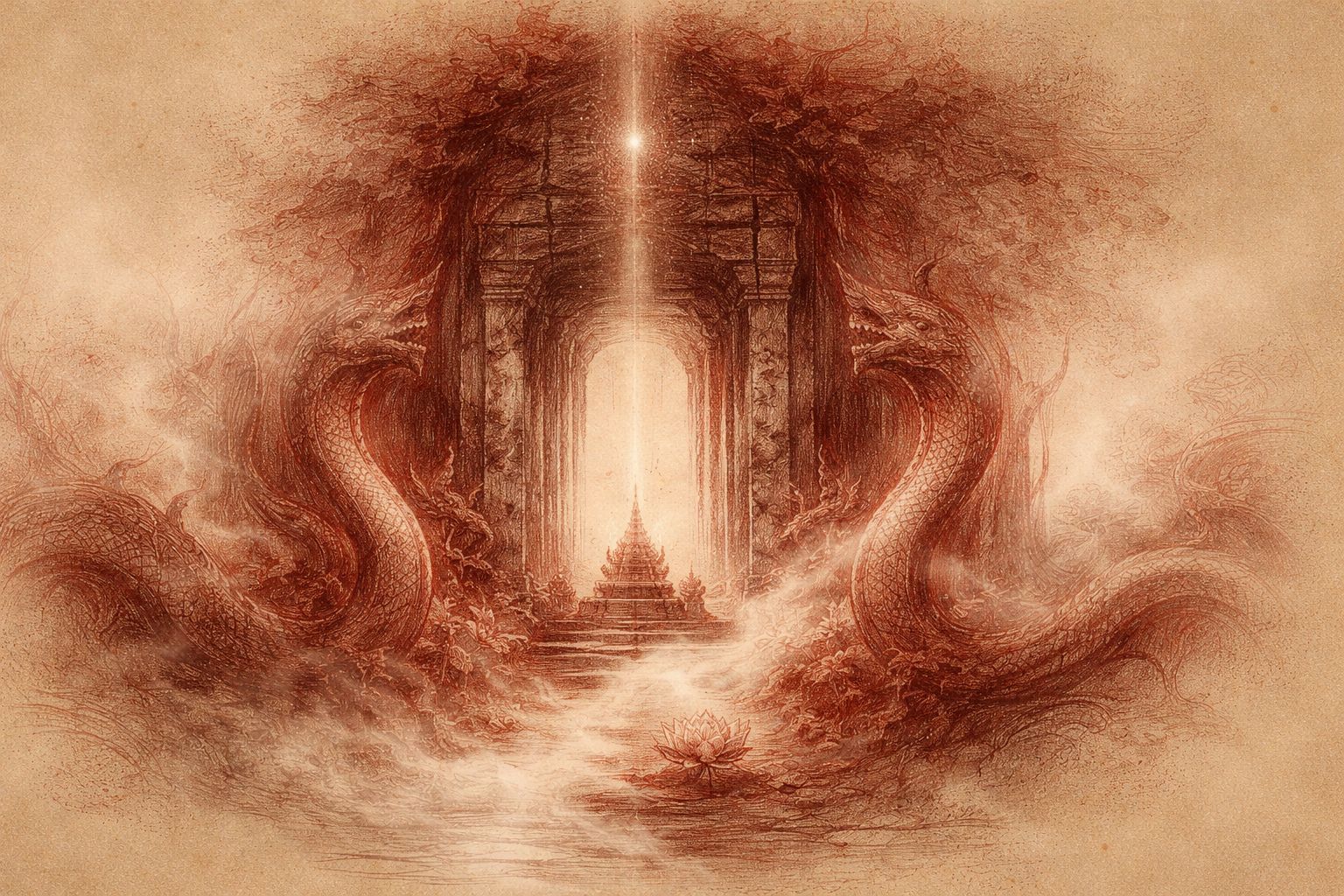
Stone That Remembers the Sky
1 min read
This poem listens to Angkor not as ruin, but as grammar—where moss, shadow, and proportion carry devotion forward without spectacle. What endures here is not glory, but measure: a way of standing that no longer needs witnesses.
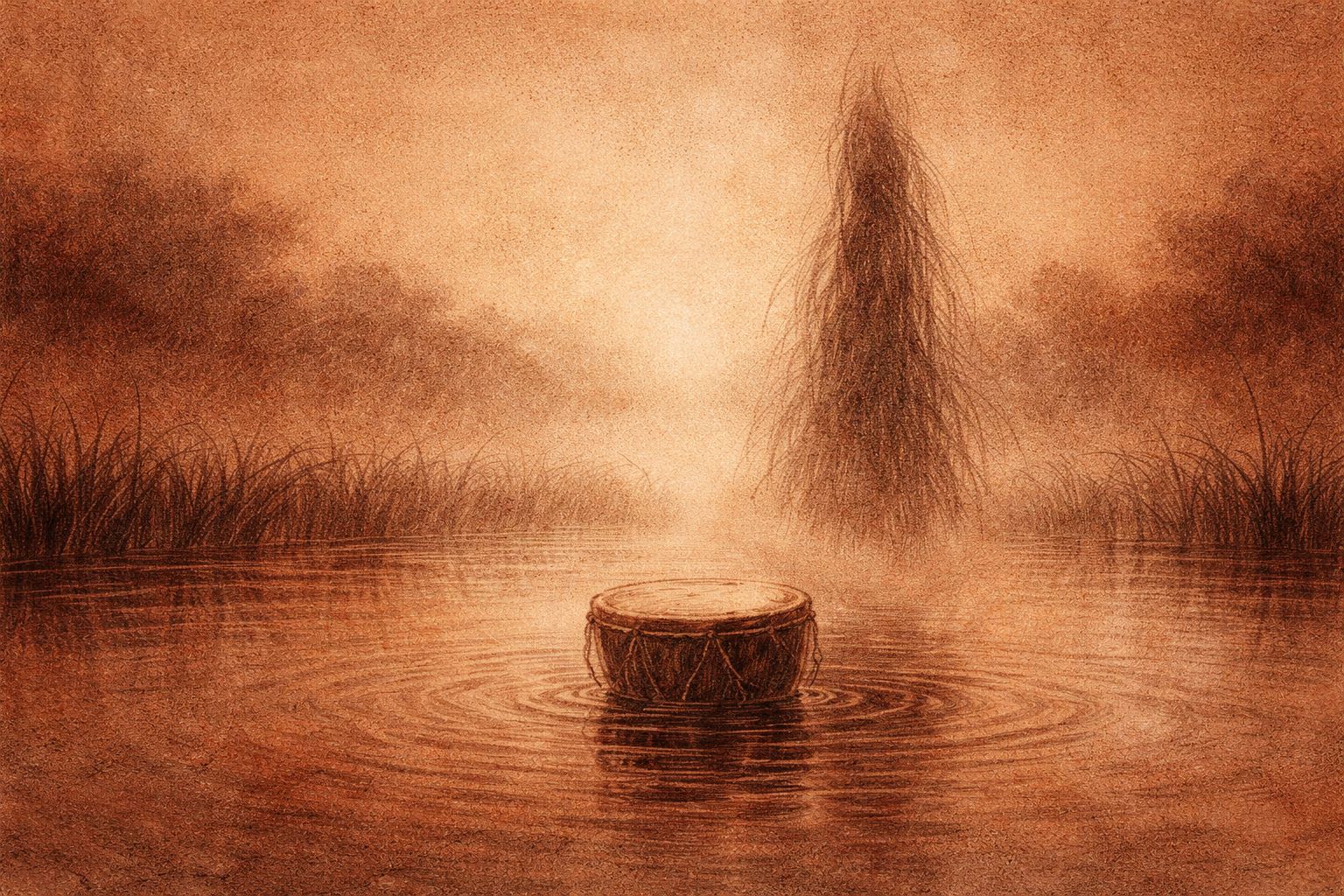
Rice-Ghost and the Seven Drums
3 min read
At harvest, the danger is not hunger but forgetting how to listen.
This folklore retelling speaks of drums struck for silence, of grain taken without gratitude, and of a narrow figure who does not punish—only waits. A tale of pacts made not with spirits, but with attention itself.
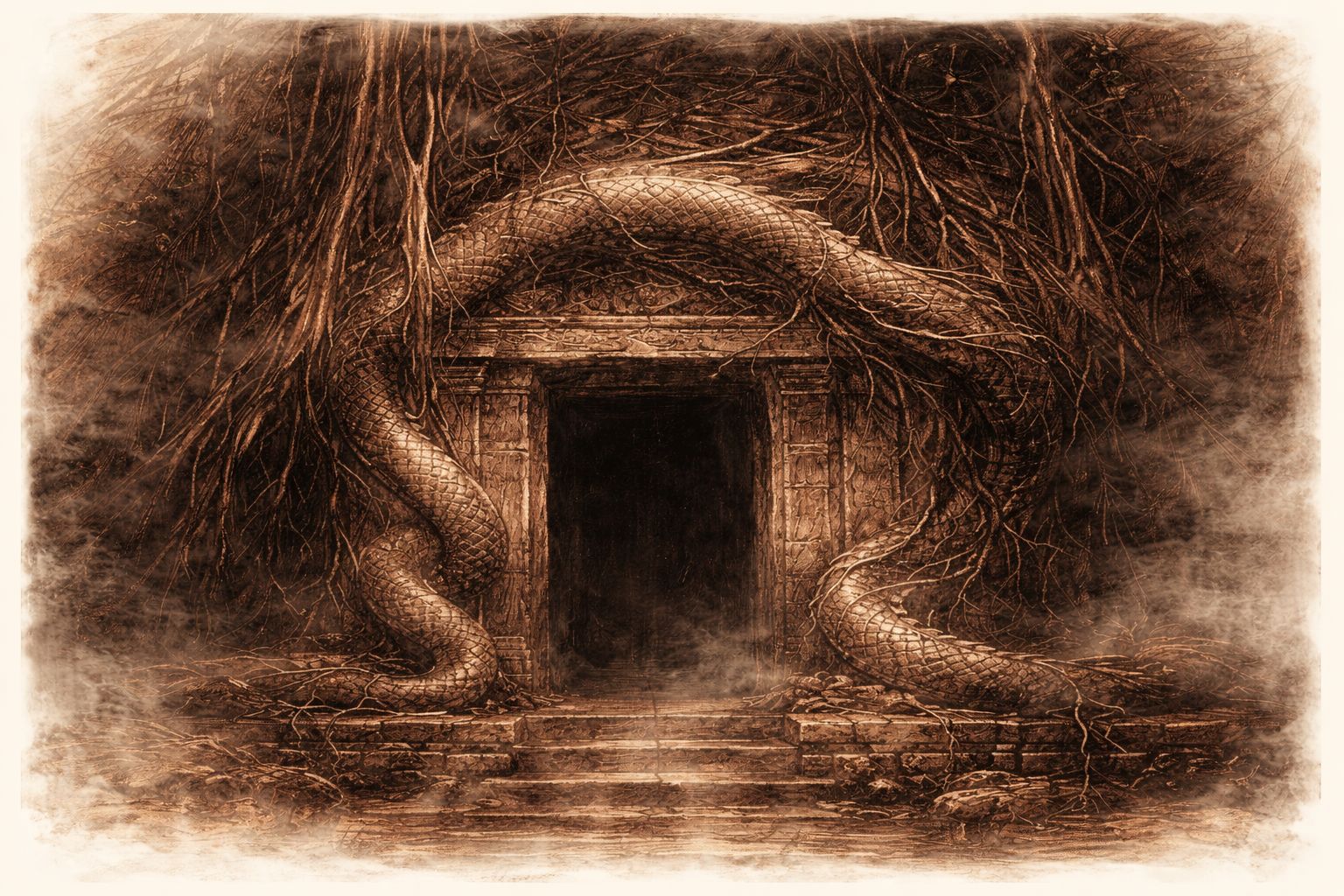
Naga Vow
2 min read
A lost city sleeps in the jungle, its thresholds carved with serpents — not ornament, but law. This vow-poem enters love as sacred hunger: desire as guardianship, devotion as possession, the body speaking without language. A liturgy of heat, roots, rain, and the terrible tenderness of being claimed.
Join My Studio Journal
Receive occasional letters from my studio in Siem Reap—offering a glimpse into my creative process, early access to new fine art prints, field notes from the temples of Angkor, exhibition announcements, and reflections on beauty, impermanence, and the spirit of place.
No noise. No clutter. Just quiet inspiration, delivered gently.
Subscribe and stay connected to the unfolding story.
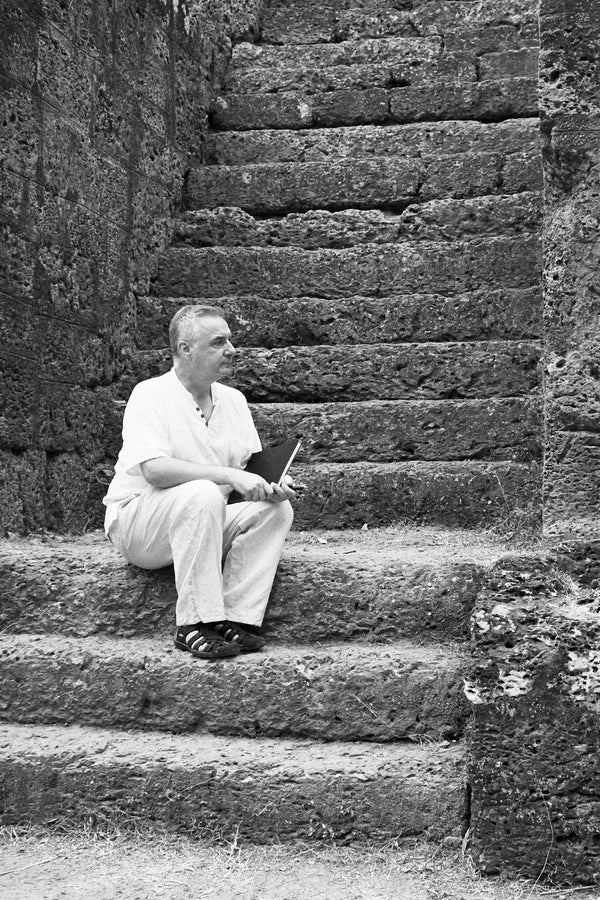
Join My Studio Journal
Receive occasional letters from my studio in Siem Reap—offering a glimpse into my creative process, early access to new fine art prints, field notes from the temples of Angkor, exhibition announcements, and reflections on beauty, impermanence, and the spirit of place.
No noise. No clutter. Just quiet inspiration, delivered gently.
Subscribe and stay connected to the unfolding story.
